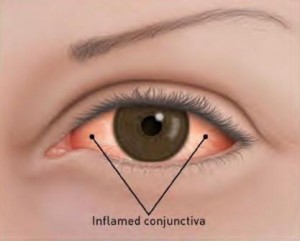 If you’ve seen a case of pink eye, you know it looks even worse than it sounds. Pink eye, or conjunctivitis, is an inflammation or infection of the transparent membrane that lines your eyelid and covers the white part of your eyeball. When small blood vessels in the conjunctiva become inflamed, they’re more visible. This is what causes the whites of your eyes to appear reddish or pink.
If you’ve seen a case of pink eye, you know it looks even worse than it sounds. Pink eye, or conjunctivitis, is an inflammation or infection of the transparent membrane that lines your eyelid and covers the white part of your eyeball. When small blood vessels in the conjunctiva become inflamed, they’re more visible. This is what causes the whites of your eyes to appear reddish or pink.
How do you get pink eye?
You can get pink eye from someone else if their bacterial or viral infection passes to you, making this very common and contagious. Chemical conjunctivitis is another possible cause, and this could be a likely origin if you were recently exposed to chemicals, fumes, or smoke. Other possibilities include allergies or having dry eyes.
If you find that you do indeed have pinkeye, it is likely a viral strain, and this condition is highly contagious. For starters, do not go to your place of work or school until the condition begins to clear up. Typically, infected individuals are able to return to their regular schedules within about one week. Although it may itch, avoid touching the area, and make sure you wash your hands frequently to protect others living in the home.
Symptoms and signs of pink eye
Eye infections can cause a wide range of symptoms, so pay attention to anything that seems unusual for you. The most common sign of an eye infection is pain. The pain can be intense of mild, and be constant or come and go. The pain can be irritated by things like light, touch and outside elements. There is a possibility of tearing or visual disturbances. If you have these symptoms visit your local Coastal Urgent Care. If left untreated pink eye infections can cause loss of vision, so its important to act fast.
The most common symptoms of pink eye include:
- Redness, itchiness, and/or gritty feeling in one or both eyes
- Thick yellow or green discharge
- Thin or clear discharge from the eye
- Painful eye in bright light
- Eyes stuck shut when you wake up in the morning
- Feeling as if something is in the eye
- A fullness feeling
- Watery eyes
When to Seek Medical Attention For Pink Eye
While pink eye can be irritating, it rarely causes long-term effects on your vision. However, it is important to seek medical attention and treatment in order to confirm that the symptoms are not due to more serious problem. With early diagnosis and proper treatment, you can help to limit its spread.
Seek immediate medical attention if:
- there is yellow or green discharge from your eye
- your eyelids are stuck together in the morning
- you have high fever, shaking chills, face pain, or vision loss
- you have severe pain in your eye when looking into bright lights
- you have blurred vision, double vision, or see rings of light around objects
- self-treatment for more than 2-3 days does not clear the irritation
- the condition recurs
- you have an underlying condition, such as diabetes
- it is a child who has conjunctivitis
Treatment for pink eye
The appropriate treatment for conjunctivitis depends on its cause:
- Allergic conjunctivitis—The first step should be to remove or avoid the irritant, if possible. Cool compresses and artificial tears sometimes relieve discomfort in mild cases. In severe cases anti-inflammatory medications and antihistamines may be prescribed.
- Bacterial conjunctivitis—This type of conjunctivitis is usually treated with antibiotic eye drops or ointments. Improvement can occur after three or four days of treatment, but the entire course of antibiotics needs to be used to prevent recurrence.
- Viral Conjunctivitis—There are no available drops or ointments to eradicate the virus for this type of conjunctivitis. Antibiotics will not cure a viral infection. Like a common cold, the virus just has to run its course, which may take up to two or three weeks in some cases. The symptoms can often be relieved with cool compresses and artificial tear solutions. For the worst cases, topical steroid drops may be prescribed to reduce the discomfort from inflammation, but do not shorten the course of the infection.
- Chemical Conjunctivitis—Treatment for chemical conjunctivitis requires careful flushing of the eyes with saline and may require topical steroids.
How can I prevent the spread of infection?
- Wash Your Hands Often, Especially Before And After Touching Your Eyes.
- Do Not Share Towels, Pillows Or Washcloths With Others.
- Wash Bed Linens In Hot Water.
If you suspect you might have pink eye or have any of the symptoms above visit your local Coastal Urgent Care today.
